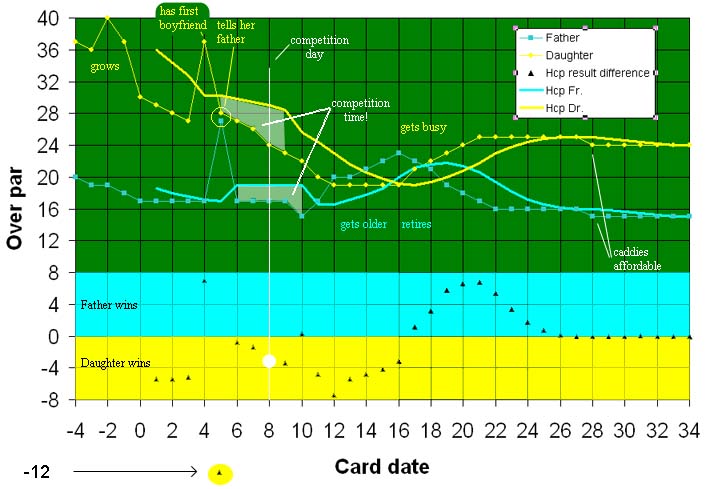 PHiLES home PHiLES home
|
| golf home |
| Bert Tells What He Reads |
| Greetings Home |

A Past-Performance Handicap Exercise Story

|
|
|
This is about a father who is regularly seen with his little daughter dancing from the hole to the next tee with her junior set. On Card Date 1 she starts with her first handicap, calculated as the average of the five cards (nrs. -4 to 0) previously submitted.

From card date -4 to 3 the little daughter grows, starts to
use adult clubs, naturally improves (from 40 over to 27 over- do not try to linearly
scale card dates in real calendar time, we could do it, but it does not matter,
card date numbers are just numbers).
At card date 3 daughter has become, say 16 years old, father has been stimulated to get his
strokes down from 20 to 17 over, but that has never been enough to win any game
from his daughter: she improves too rapidly. Then comes card date 4. Daughter has her
first boyfriend, her father does not know about it. She plays 37 over. Father,
as always: 17 over. For the first time ever, he wins, even by 7 "net" strokes!
On the next card date (5) she tells him about it at the tee of the 4th
hole and recovers remarkably the rest of the game. Father drags himself from hole
4
to 18, and ends 27 over, one gross stroke below his daughter. His net loss
(-12) even falls below our graph.
At card date 6 things get back to normal: father constant on 17 over or so,
daughter getting 2 or three strokes off every card date. With both of
their handicaps now raised, daughter wins again as usual around 2 net
strokes. Father
realizes it is competition time and starts checking web sites. Daughter's
competition time runs until card date 9, after which date her dip score will
fall off her handicap calculation, and his own will end on card date 10.
Fortunately he finds a competition on card date 8. Both daughter and father win and celebrate on the club house
veranda with daughter's boyfriend, a promising teen age tennis player. Back on their
home course at card dates 10 and 11 they experience the retarded effect of
the boyfriend jitters five card dates earlier: on card date 10 father even has
an isolated win. He
may be proud having scored 2 gross strokes lower than normal, but his win was due to
something else: his daughter's boyfriend jitter's dip score is now 6 cards ago
and for the first time today OFF her handicap calculation, so she was back on low handicap.
Father's jitters were on the next card, hence still IN his handicap
calculation. Next time he will have to be better to win, even if his daughter
will be equal to today.
Then father's game gets worse a bit. He gets older, and actually starts to need
(gross) more strokes than his daughter for the first time on card date 12, but
things reverse when at card date 16 he retires, starts to play 36 holes a day, and at the same time his daughter
gets busy jobs and children, joining him only 18 holes every other weekend. Two
card dates later father's day score dives under his handicap again, partly because
his score goes down while his handicap is still going up. His reward is a
series of wins with more than 4 net strokes. Father's and daughter's gross
scores stabilize at card date 22 but father has another 5 wins before the
handicaps have stabilized as well (at card date 27). Then draws start to set
the tone. On card date 28 they decide they now can afford caddies. This saves
both of them a shot (father saves energy, daughter saves on lost balls). Five score cards
later both their handicaps are a shot down, but against each other they keep
playing draws during this one stroke handicap dive.
Daughter requested to suppress the period after she separated and retired at 49 with half of her husband's tennis fortune, liberally paid some top pro's to have a look at her swing while her father, in his late 70s and early 80s, still going strong on the course, still was among her favourite company. Exercise for the reader: work out plausible score, handicap and father-daughter competition timelines for the suppressed period. (How is your result altered if father, 91 years old, in his last game is taken to hospital from the fringe of the 18th hole, while his ball after a magnificent long put is in the position as in the right of picture 3? (you may assume father will survive to sign a score card but will do so only if this is conforming the rules).